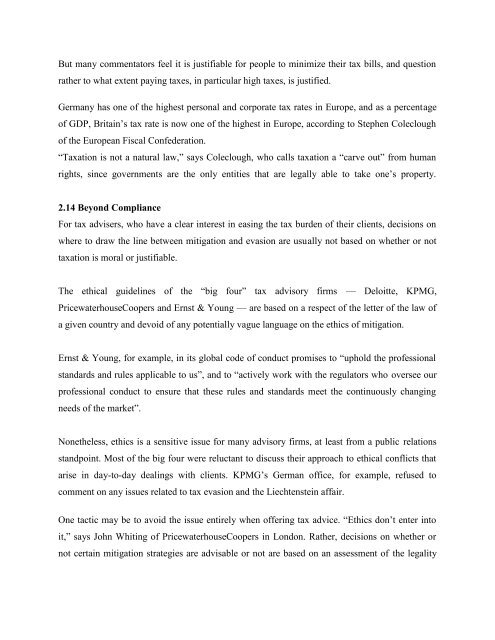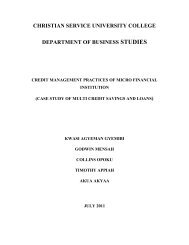TAX EVASION.pdf - Christian Service University College
TAX EVASION.pdf - Christian Service University College
TAX EVASION.pdf - Christian Service University College
You also want an ePaper? Increase the reach of your titles
YUMPU automatically turns print PDFs into web optimized ePapers that Google loves.
But many commentators feel it is justifiable for people to minimize their tax bills, and question<br />
rather to what extent paying taxes, in particular high taxes, is justified.<br />
Germany has one of the highest personal and corporate tax rates in Europe, and as a percentage<br />
of GDP, Britain’s tax rate is now one of the highest in Europe, according to Stephen Coleclough<br />
of the European Fiscal Confederation.<br />
“Taxation is not a natural law,” says Coleclough, who calls taxation a “carve out” from human<br />
rights, since governments are the only entities that are legally able to take one’s property.<br />
2.14 Beyond Compliance<br />
For tax advisers, who have a clear interest in easing the tax burden of their clients, decisions on<br />
where to draw the line between mitigation and evasion are usually not based on whether or not<br />
taxation is moral or justifiable.<br />
The ethical guidelines of the “big four” tax advisory firms — Deloitte, KPMG,<br />
PricewaterhouseCoopers and Ernst & Young — are based on a respect of the letter of the law of<br />
a given country and devoid of any potentially vague language on the ethics of mitigation.<br />
Ernst & Young, for example, in its global code of conduct promises to “uphold the professional<br />
standards and rules applicable to us”, and to “actively work with the regulators who oversee our<br />
professional conduct to ensure that these rules and standards meet the continuously changing<br />
needs of the market”.<br />
Nonetheless, ethics is a sensitive issue for many advisory firms, at least from a public relations<br />
standpoint. Most of the big four were reluctant to discuss their approach to ethical conflicts that<br />
arise in day-to-day dealings with clients. KPMG’s German office, for example, refused to<br />
comment on any issues related to tax evasion and the Liechtenstein affair.<br />
One tactic may be to avoid the issue entirely when offering tax advice. “Ethics don’t enter into<br />
it,” says John Whiting of PricewaterhouseCoopers in London. Rather, decisions on whether or<br />
not certain mitigation strategies are advisable or not are based on an assessment of the legality



